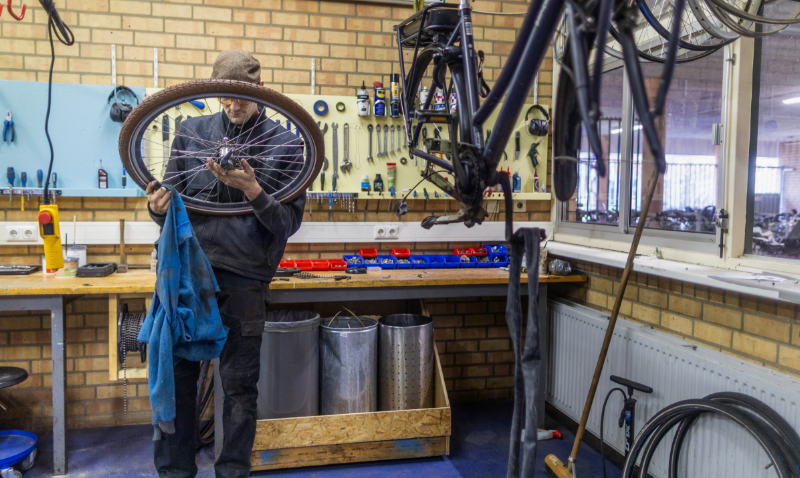Windesheim has its own bicycle repair shop on the campus grounds again: Roestug University.
The bicycle workshop on the Zwolle campus was empty for six months, but Windesheim has now found a new operator in the company Roestug. Circularity and reuse are most important in the sustainable bicycle workshop, where ‘donor’ parts from old bicycles are used as much as possible.
Roestug has been around for a few years. It was founded by three former Windesheim students Industrial Design Engineering and Finance & Control: Bram Vreugdenhil, Gerke Slotboom and Hermen Fikse. The company started as a start-up in bicycle recycling at ZWINC. The bicycle workshop at the Ceintuurbaan (Breinn’s Makersfabriek) will also continue to exist.
Abandoned bicycles
The former students thought about how unfortunate it is that all over the city ‘orphan bikes’ are being left behind, which still have many usable parts on them. Roestug asked the Algemene Fiets Afhandel Centrale, which collects abandoned bikes in Zwolle, if they could ‘save these orphan bikes from the stake’ and reuse them. They now also receive old bikes via other partners.
Roestug reuses as many parts as possible from the old bicycles during repairs. And they assemble new bicycles from them, which can be sold in the circular bicycle workshop: the so-called ‘Frankenstein’ bicycles.
Transition
Vreugdenhil: “We want to contribute to the transition to a circular economy with our company. That is quite a challenge, because not all materials on a bicycle can be repaired. Such as worn-out tires, mud and chain guards. You cannot use these parts again as bicycle parts.”
That’s why they look into whether materials that are not suitable for repair can still be reused. For example, the plastic is recycled. And they make key rings and belts from worn-out tires, which they sell in the bicycle workshop.
Circularity
Why is circularity so important? Vreugdenhil: “It can be a solution to a fascinating problem. The linear economy has brought us a lot of prosperity, now the question is whether we can maintain this without exceeding the carrying capacity of the earth. Circularity may well be the answer to that question!”
The prices and rates of the bicycle workshop are largely the same as those of regular bicycle repair shops, except that the customer often pays half or less for second-hand parts.
Repair your own
You can also tinker with your bike yourself in Roestug’s bicycle workshop. “That saves on costs, but it is also satisfying to repair your own stuff,” says Vreugdenhil.
The bicycle workshop offers internships and experience places for MBO students and people with a distance to the labor market. Roestug also gives bicycle seminars and guest lectures on circularity.
The bicycle workshop is located next to the entrance of the main building and is open from Monday to Thursday.
text: Ernest Mettes
photo: Herman Engbers
